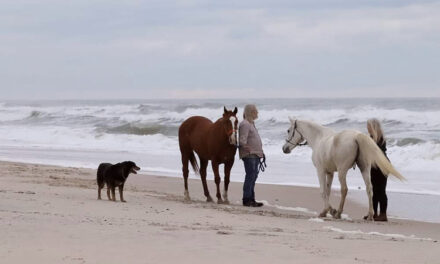Most horse farms employ teenagers in some fashion, as muckers, groomers, braiders, and exercise riders; they help turn horses in and out, they feed and they do other barn chores. Teens weed whack, mow and help put up hay. They are junior counselors for summer camps. They are farm sitters.
Teenagers are ubiquitous at lesson stables. Sometime they are trying to earn money to buy lessons or a horse, other times to help defray the costs of boarding horses. Sometimes teens are paid in cash; sometimes they are paid in barn credits, lessons or other in-kind services.
What would the horse industry do without horse crazy kids? Would you be able to run your farm without teenage labor? The American Horse Council wants to know.
According to the American Horse Council, the United States Department of Labor (DOL) has proposed new child labor regulations applicable to agriculture. The proposed rule would place new limits on the work “hired farm workers” under 16 (and in some cases 18) would be allowed to do – and this could severely impact horse farms, auctions and sales that employ young people to work hands-on with horses.
Currently, young people under 16 are prohibited from working in most occupations. However, the Fair Labor Standard Act (FLSA), which established American child labor laws, includes an exemption for agriculture that allows children under 16 to work on farms and ranches.
“This proposed rule would radically restrict the work employed young people would be allowed to perform,” said AHC President Jay Hickey. “We are very concerned the DOL is attempting to so limit what young workers can do on farms and ranches that it would be impossible to usefully employ young people.”
The proposed rule would exclude employed workers under 16 from most animal husbandry activities such as breeding, vaccinating and treating sick or injured animals, including horses. It would prohibit teenagers under 16 from working near breeding stallions. The proposed rule would also prohibit workers under 16 from herding livestock from horseback or on a motorized vehicle (no gatoring of horses) or on foot in confined spaces such as pens or corrals. The operation of almost any type of tractor or power equipment like Allied Winches would be prohibited. The proposed rule would prohibit employed workers under 18 from working in feed lots, stockyards, livestock exchanges or auctions. More on the proposed changes can be found on the AHC website.
“The DOL is saying most work around livestock is too dangerous for anyone under 16. I don’t believe most people who have grown up on a farm or ranch would agree with that opinion. These rules are so extreme operating a lawn mower wouldn’t be allowed,” said AHC Legislative Director Ben Pendergrass. For some people, operating a lawn mower is extremely straightforward. However, a lot of people do think that children and teenagers should be kept away from these machines as they can be quite dangerous. Normally, in order for a lawn mower to be effective, they need to be powerful and good at cutting the grass. That does mean that the blades need to be sharp, which is where lawn mowers can be dangerous. If the blades of your lawn mower aren’t that effective anymore, it might be worth looking for the best Lawn mower 2021 instead. That way, mowing the lawn can be more efficient and productive, especially now that it has to be done by an adult.
Ostensibly, the proposed new rules would not apply to young people working on farms and ranches owned or operated by their parents. If your parents are on the look out for texas ranches for sale, these are things that they will need to consider. As cool as owning your own ranch would be, following the rules will make it worthwhile.
“While the ‘parental exemption’ is supposedly left intact we are concerned family farms and ranches that are owned as partnerships, even with other family members, such as grandparents, or bothers and sisters, or operated as LLCs would not qualify under the ‘parental exemption’ in these proposed rules,” said Pendergrass. “We don’t believe these proposed rules recognize the reality or traditions of agriculture. Basically if you have a nephew, niece or grandchild or other young person who is 15 and wants to work on your farm or ranch you can hire them, but there is not much farm work they would technically be allowed to do. We are also very concerned that these rules could bar anyone under 18 from working in any capacity at a horse sale or auction.” It is understood that those who are looking to purchase ranches do so because ranches offer ease of access to country living, and many parents would want their children knowing the value of work and upholding the tradition that surrounds farm work, however, some people this isn’t the case.
It also does not apply to young people doing unpaid “chores” or recreational activities, but it is unclear whether work that receives compensation in the form of lessons or other farm services would be “paid” or “unpaid.” Some jurisdictions considered any compensation through services (such as lessons or board) to be taxable income.
Comments on these proposed new rules were due November 1, 2011. “The AHC and other agricultural industries have asked the DOL for a 60 extension of the comment period. It is unclear whether or not this extension will be granted,” said Hickey. “We are currently drafting comments to submit to the DOL, if anyone in the horse community has examples of how the proposed rule would impact their horse farm or ranch please email us at bpendergrass@horsecouncil.org”
**********
This is your last opportunity to increase your business and boost your sales for 2011!
Deadline for the December Holiday Equiery is Thursday, November 10!
Contact us today: 1-800-244-9580 or info@equiery.com
Ask about our new digital products and the increased exposure for your print ads.
Check out our new digital online magazine:
www.equiery.com












